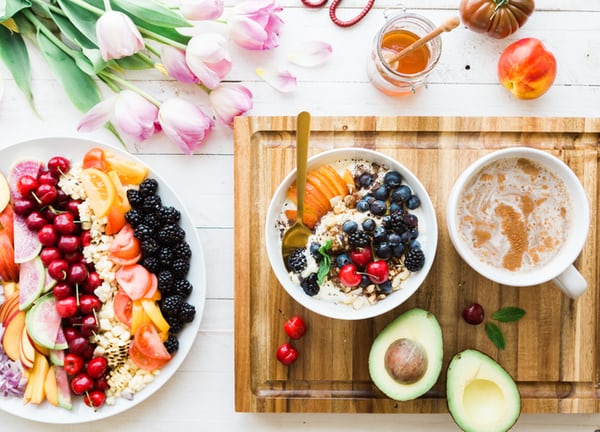How does Fiber Help Irritable Bowel Syndrome (IBS)?

IBS (irritable bowel syndrome) is surprisingly more common than you might think. Here are some quick facts about IBS to get you up to speed on what exactly it is:
- 13-20% of Canadians (which is about 5-7 million people) live with IBS. Only 40% of these people will go and actively seek medical assistance.
- IBS is more common in women than men, but IBS is present in practically all age groups (children to elderly).
- The primary symptoms, or the ‘ABCDs’ of IBS, are: Abdominal pain, Bloating, Constipation, and/or Diarrhea
For our detailed article on IBS (a beginner’s guide to IBS) click here!
You, or someone you know with IBS might have already heard about (or been recommended by a medical professional) the benefits of fiber for IBS symptoms. This is true. Fiber has been proven to help with reducing the symptoms of IBS, along with several other benefits for your body. However, it is important to understand that fiber intakes for each person can vary (some need more, others need less). On top of this, fiber intakes should be paired with other lifestyle changes (which you can read about in our blog here).
Today, we’re going to answer the question: how does fiber help IBS? Let’s take a look at the role fiber plays on digestive health, your overall health, and what fiber supplements/foods you could start with.
Are there different types of fiber?
Yes, there are two types of fiber found in plant-based foods. These are soluble and insoluble fibers (read our detailed article on these fibers here)
Soluble fibers easily dissolve in water, creating a gel-like substance. This gel helps with making bowel movements soft and smooth.
Insoluble fibers are different, as they absorb water instead of dissolving. These fibers are left intact and help create bulk to stools, while also helping stimulate movement through the digestive tract.

What exactly does fiber do for me?
Fiber has a ton of benefits for your body, which is why it’s important to always try and get as much fiber as possible per day! Fiber has been proven to help in the following ways:
- Ease the symptoms of IBS, such as bloating, abdominal pain, constipation, and diarrhea.
- Helps to improve digestion and overall gut health.
- Lowers cholesterol levels.
- Helps to regulate blood sugar levels, which leads to less fatigue, more consistent energy levels, less inflammation, and makes you feel fuller after meals.
- It also helps reduce the chance of getting diabetes, heart disease, and colon cancer.
For digestive health and IBS, fiber plays an important role. Fiber, and especially soluble fiber, has been shown to help with symptoms and constipation for people with IBS. By slowly increasing your fiber intake with appropriate portions of high-fiber foods that also are low in fermentable carbohydrates (Such as a fodmap diet (link here), patients with IBS can find relief—along with an improved overall dietary pattern. On top of that, it helps with forming regular and sifter bowel movements, which help to prevent constipation.
What can I do to start getting more fiber in my diet to help with IBS?
There are several simple, stress-free ways to get more fiber in your diet. To get the greatest health benefits, eating a wide variety of foods high in fiber should be a priority! Whole plant-based foods contain both soluble and insoluble fiber, but some contain more of one than the other.
Foods that are high in soluble fiber include oats, barley, beans, peas, lentils, citrus fruits and apples.
Foods that are high in insoluble fiber include whole Grains: whole-wheat flour, wheat bran, brown rice, couscous, quinoa; vegetables: cauliflower, green beans, potatoes, celery, cucumbers, corn, spinach, kale; fruits: strawberries, grapes, kiwi, raspberries, pineapple, rhubarb; legumes: lentils, chickpeas, nuts and seeds.
To get more soluble fiber that isn’t necessarily a food, we recommend trying out fiber supplements! Fiber supplements are high concentrations of soluble fiber that can be consumed through mixing it into beverages, recipes, and meals.
To get the optimal amount of fiber per day, a fiber supplement like NutraStat is an easy, natural solution. Our fiber has been designed and tested to be the most effective fiber supplement on the market.
Our Fiber Supplement: NutraStat
NutraStat is a natural fiber produced from 100% Canadian barley and can help you take control of your gut health naturally. Our process extracts beta-glucan fiber from the barley grains without the use of any solvents, chemicals, or additives; resulting in a natural and sustainable fiber supplement that is good for you and good for the planet. NutraStat is designed to be the most effective mixture of both soluble and insoluble fiber on the market, meaning it can help those suffering from constipation and diarrhea, common symptoms of IBS.
If you’re interested in buying NutraStat, you can do so here. Proactively start improving your digestive and overall health today.
Sources:
IBS Awareness Month | Gastrointestinal Society (badgut.org)


